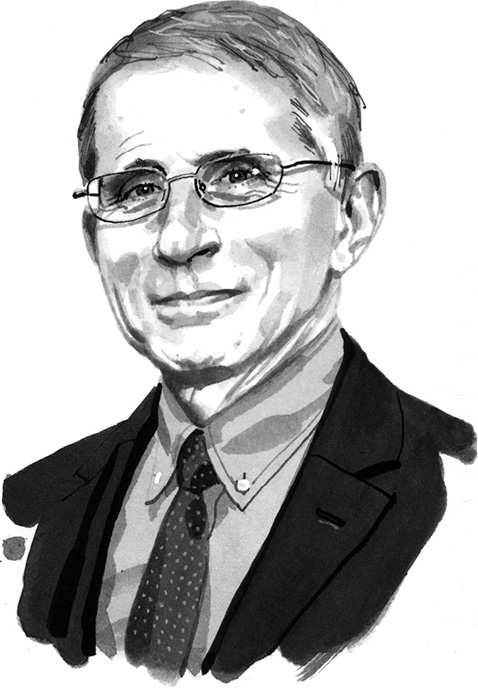
DR. ANTHONY S. FAUCI
Director, National Institute of Allergy and Infectious Diseases at the National Institutes of Health
“You don’t dictate to people. But if you let them know what your vision is, hire the best people, and then don’t get in their way, those are the qualities of a good leader.”
During the COVID-19 crisis, Dr. Anthony Fauci, the director of the National Institutes of Health’s National Institute of Allergy and Infectious Diseases, became one of the best-known and most respected individuals in the United States, and indeed the world.
I have known Tony for many years, and have interviewed him on a number of occasions. Part 1 of this interview took place in Washington, D.C., on April 15, 2019. Part 2 took place at the Economic Club of Washington, D.C., on April 28, 2020.
Shortly before that latter interview, I wrote an article about him for USA Today. I think that article succinctly summarizes my views about this extraordinary public servant. It is reprinted here by permission:
Some viewers of the daily White House coronavirus briefings may wonder why everyone increasingly defers to a diminutive, Brooklyn-accented 79-year-old doctor, Anthony Fauci. They do because, as I have learned over many years of talking with and more recently interviewing this man, he is without doubt the world’s leading authority on infectious diseases.
In any area of human activity or knowledge, there always seems to be one person who is the global gold standard. In the world of infectious diseases, that person is Tony Fauci. The American people—indeed, people around the globe—should be grateful that Tony has dug into this crisis with the same work-around-the-clock, just-the-facts style that he has used while serving under and working with six U.S. presidents.
He is as apolitical as anyone can be. I have no idea whether he is registered with any political party; I suspect that he is rabidly independent. His only focus is on getting the facts out, providing the best health care treatment and information possible, and saving lives.
Tony joined the National Institutes of Health in 1968, after completing his medical training at Weill Cornell Medical Center, and he has led the National Institute of Allergy and Infectious Disease at NIH since 1984—36 years. Hard to believe anyone can run anything that long and still be at the top of his game. But Tony is. During this period, he has dealt with every serious infectious disease challenge—malaria, tuberculosis, HIV/AIDS, the Middle East respiratory syndrome, the severe acute respiratory syndrome, dengue fever, Ebola, to name a few—and now the most serious pandemic since the 1918 flu, COVID-19.
Among Tony’s best-known accomplishments, beyond running the institute and training dozens of the world’s top infectious-disease professionals, has been helping to discover how HIV leads to AIDS and leading the effort to create (at President George W. Bush’s direction) the President’s Emergency Plan for AIDS Relief, which has transformed the treatment of HIV/AIDS in Africa and other parts of the developing world. Millions of lives have been saved by this program alone.
More recently, Tony has been an architect and powerful advocate of President Donald Trump’s plan for ending the AIDS epidemic in the United States through HIV antiretroviral therapy targeted to disease hot spots.
In his spare time, Tony has been involved with writing or editing more than 1,100 scholarly articles and several textbooks, and, in the process, has become one of the most cited authorities of the entire medical profession.
For these breakthrough activities and his dedicated service, at a government salary, for more than a half-century—he worked at NIH for 16 years before assuming his current role—Tony has received the Presidential Medal of Freedom and a Lasker Award (called the American Nobel by many). He has earned them.
With this long service and universal acclaim, one might think Tony would let it get to his head, at least a little bit. Not the case, though.
He is readily accessible to those who need treatment—he still runs a lab at NIH—or information. Tony still lives in the same house he bought when he first moved to Washington, and it is there that he and his wife, Dr. Christine Grady, have raised their three talented daughters (though none of them chose to attend medical school).
Until the latest crisis, Tony has often commuted to NIH by Metro, typically after running or power-walking several miles for his daily exercise. And when he has been invited to make speeches in the Washington area or on Capitol Hill, he invariably turns down a car and driver for the Metro. (This practice has had to change of late for the obvious reasons.)
There are, of course, many other dedicated federal servants who also value their commitment to the country and its people over financial rewards. But surely no federal civil servant, in any area, can exceed Tony Fauci’s long-term and selfless commitment to this country and the health of its people.
I tried years ago, when Tony was approaching a normal retirement age, to see whether he might want, after a normal lifetime of federal service, to take some of his considerable skills and knowledge to the private sector. He quickly said no—money did not motivate him, serving the country did. And he stayed at NIH—to the country’s good fortune.
If there is any one medical professional who can help the country deal with the COVID-19 crisis, it is Tony Fauci, an example of the best this country has to offer. He is not a miracle worker. No one is. Nonetheless, Tony has the decades of experience needed to understand infectious disease problems and prescribe treatments that should, in time, provide the requisite comfort, even if in the short term the medicine is painful and inconvenient.